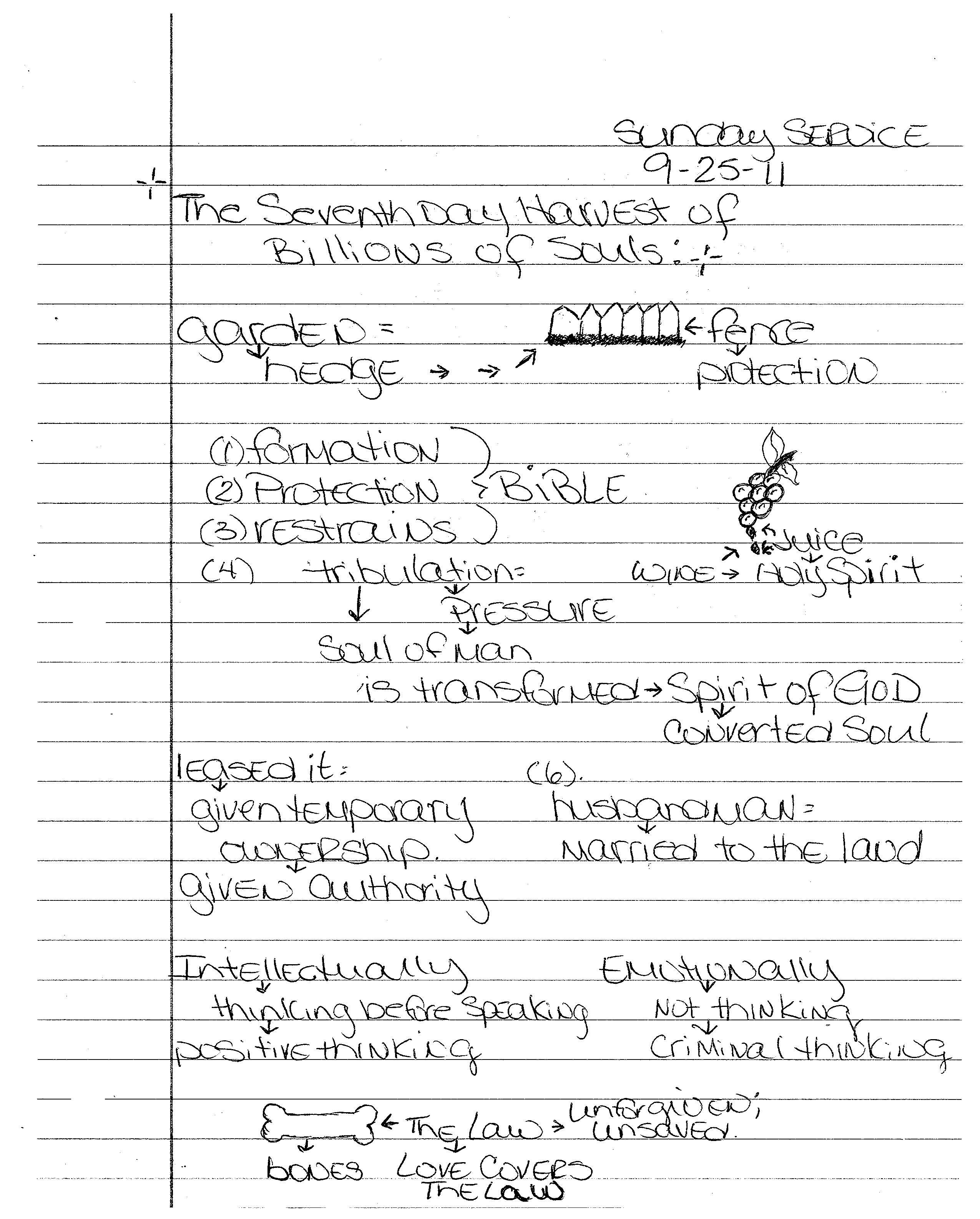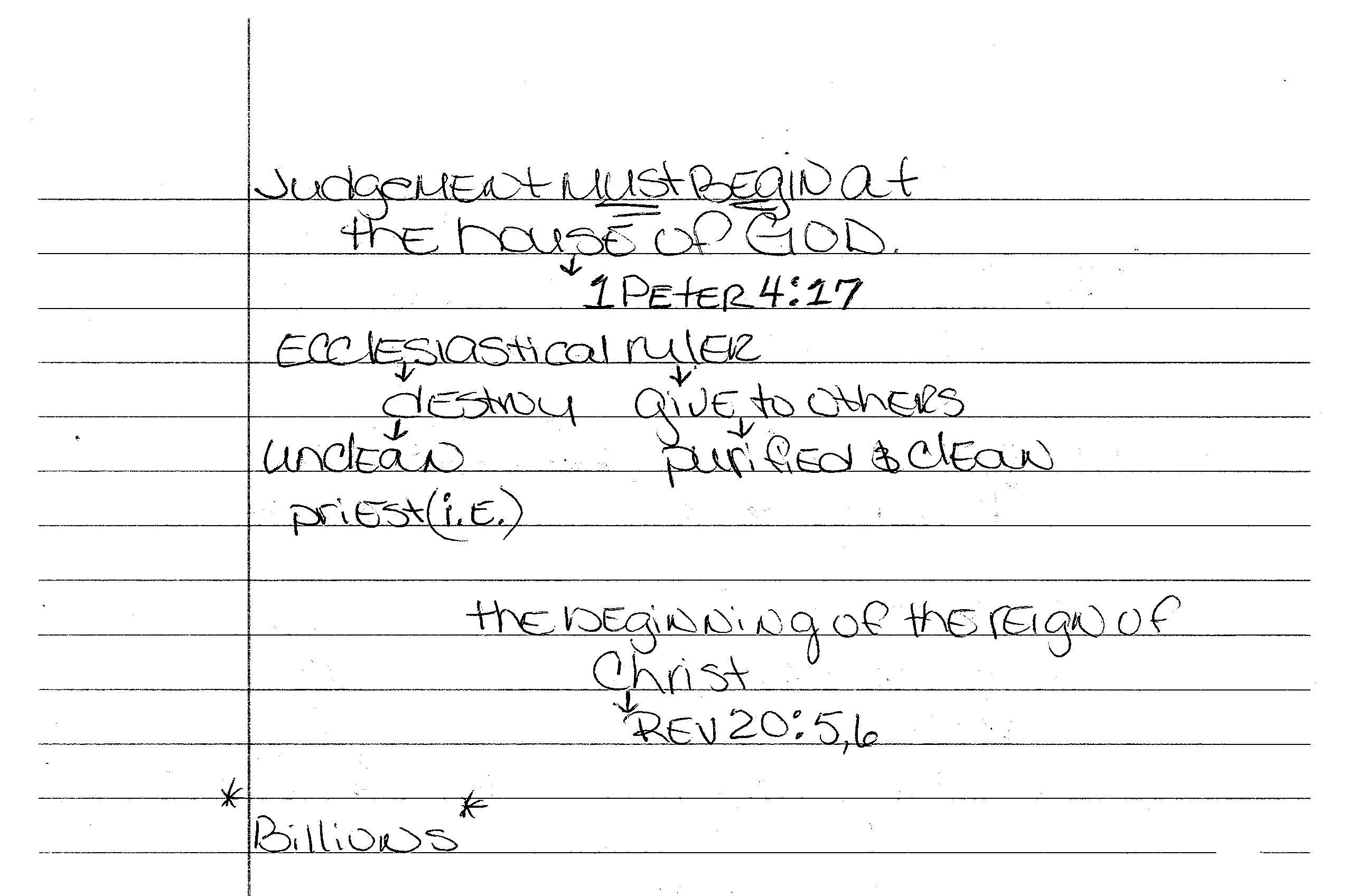THE END of TIME |
Chapter 43 |
THE SEVENTH DAY HARVEST OF BILLIONS OF SOULS
09-25-11
SETTING THE STAGE
(Mat 21:33) Hear another parable: There was a certain householder [Gk: the head of a family] [the Father], which planted [Gk: plant, fig. to instill doctrine /// to germinate or grow] [i.e., life] a vineyard [Gk: a vine (as coiling about a support)] [God is the support, Jesus Christ is the vine: “I am the vine, ye are the branches” John 15:1], and hedged it round about [with the Law] [with “a wall about it” NIV], and digged [into the heart of the earth] a winepress in it [“the winevat” Mark 12:1], and built a tower [a pulpit, a preaching teaching platform], and let it out [Gk: leased it] to husbandmen [Gk: a land-worker, a farmer], and went into a far country [fig. Heaven: ref. Mat 25:14; Luke 19:12] [“for a long time.” Luke 20:9]:
1. hedge = Gk: a fence, or inclosing barrier:--hedge (+ round about), partition.
2. hedge = Heb: to entwine, i.e. shut in (for formation, protection, and restraint):--fence.
3. (Psa 34:7) The angel of the LORD encampeth round about them that fear him, and delivereth them.
4. Commentary: “a winepress” = was used to separate the fruit from the husk, to squeeze the wine of the Holy Spirit out of the heart of the grape. The Garden of Gethsemane (Gk: olive press), is a parallel type of metaphor where Jesus “sweat was as it were great drops of blood falling down to the ground.” (Luke 22:44). Through tribulation (Gk: pressure) the soul of man is “transformed” (Rom 12:2) into the Spirit of God. “Then shall the dust [the things and thoughts derived from this world] return to the earth as it was: and the spirit [i.e., the converted soul] shall return unto God who gave it.” (Eccl 12:7).
5. tower = Heb: a tower (from its size or height); by anal. a rostrum; :--castle, flower, pulpit.
a. rostrum = Dict: 1. any platform, stage, or the like, for public speaking. 2. a pulpit.
6. Commentary: “husbandmen” = are men who are sharecroppers, men who are married (“husband”) to the land, but do not own the land (God owns the land). These men whom Jesus was speaking to were “the chief priests, and the scribes, and the elders” (Mark 11:10), who were given authority (the lease) over the land, i.e., ecclesiastical rule. In modern terminology, we call this group of men who have been given the authority of ecclesiastical rule priests, pastors, ministers, deacons, and elders.
7. (Acts 1:9) And when he had spoken these things, while they beheld, he was taken up; and a cloud received him out of their sight.
THE ACTION
(Mat 21:34-37) And when the time of the fruit drew near, he sent his servants [the prophets] to the husbandmen, that they might receive the fruits of it [“to get his share of the fruit” Amplified Bible]. And the husbandmen took his servants, and beat one, and killed another, and stoned another. Again, he sent other servants more than the first: and they did unto them likewise. But last of all he sent unto them his son [the First Advent of Jesus Christ] [“his wellbeloved” Mark 12:6; “I will send my beloved son” Luke 20:13], saying, They will reverence my son.
1. (Amos 3:7) Surely the Lord GOD will do nothing, but he revealeth his secret unto his servants the prophets.
(Mat 21:38,39) But when the husbandmen saw the son, they [“the chief priests, and the scribes, and the elders” Mark 11:10] said among themselves, This is the heir; come, let us kill him, and let us seize on his inheritance. And they caught him, and cast him out of the vineyard [fig. cast Him out of Jerusalem, out of the church], and slew him [on a knoll located outside the city (Mat 5:14) of Jerusalem called Golgotha (Gk: the skull)].
1. Commentary: “This is the heir” = i.e., the chief priests, scribes, and elders, having seen the evidential miracles, intellectually recognized Jesus Christ for whom He was, but emotionally the innate lusts that manifested themselves in their greed for prominence, admiration (worship actually), and earthly riches at hand were far greater and stronger than any fear of eventual (syn: perhaps) righteous retribution. They were rather like a criminal first contemplating the possible consequences of an illegal act if caught (syn: perhaps); and then, deeming the present at hand personal profit, the lust, more imperatively gratifying than the dimly perceived cautionary warning that carried only the possibility (syn: perhaps) but not the probability of eventual punishment, they perform the illegal action.
THE DENOUEMENT
1. Dictionary: denouement = the final disentangling of the intricacies of a plot, as of a drama or a novel.
2. Only the words of Jesus Christ are boldfaced in the following verses:
(Mat 21:40,41) When the lord therefore of the vineyard cometh [the Second Advent of Jesus Christ], what will he do unto those husbandmen? They [the chief priests, scribes, and elders] say unto him, He will miserably destroy those wicked men [a prophetic and self-judgmental statement], and will let out [Gk: lease] his vineyard unto other husbandmen, which shall render him the fruits in their seasons [plural].
1. miserably = Gk: badly (phys. or mor.):--amiss, diseased, evil, grievously, miserably, sick, sore /// worthless (intrinsically such), i.e. (subj.) depraved, or (obj.) injurious:--bad, evil, harm, ill, noisome, wicked.
2. Commentary: “He will miserably destroy those wicked men” = these self-ascertained “wicked men,” although ecclesiastical rulers, are not imputed for righteousness nor are they under Grace (the forgiven saved), but remain still under Law (the unforgiven unsaved). Their usage of “misery” is reflective as one peering into a mirror or the still water of a pond, and quite describes their desperate situation for they shall suffer for their evil deeds “Eye for eye, tooth for tooth” (Exo 21:24). “For the time is come that judgment must begin at the house of God: and if it first begin at us, what shall the end be of them that obey not the gospel of God?” (1 Pet 4:17).
3. (Mark 12:8,9) And they took him, and killed him, and cast him out of the vineyard. What shall therefore the lord of the vineyard do? he will come and destroy the husbandmen, and will give the vineyard unto others.
4. (Luke 20:15,16) So they cast him out of the vineyard, and killed him. What therefore shall the lord of the vineyard do unto them? He shall come and destroy these husbandmen, and shall give the vineyard to others. And when they [the chief priests, scribes, and elders] heard it, they said, God forbid.
5. Commentary: Eschatology: At the Lord Jesus Christ’s first coming He entered Jerusalem (the church) riding the male colt of a female ass (connoting humility; a sure-footed and laboring servant), and His appearance and demeanor was as the Lamb of God in peace. At the Lord Jesus Christ’s second coming, He will enter Jerusalem (the church) riding a white horse (connoting truth, power, and war) as the Lion of Judah in fiery judgment. The first act of Jesus Christ upon His second coming will be to completely purge and purify His bride the church. Why? So that we who are saved, “the third part (who pass) through the fire” (Zec 13:8,9), shall be perfectly cleansed and be perfect witnesses for the Lord “to the years of many generations” (Joel 2:2), i.e., throughout the thousand year millennium (Rev 20:4,5).
6. Commentary: Eschatology: We who are saints (children of God) are now daily training and practicing for the final harvest, “the seventh day” (Gen 2:2) harvest of multiple billions of born again saints. That great harvest will be achieved by saints who are now “dead in Christ” in cooperation with those who are “alive and remain” (1 Thes 4:16,17) beginning at His second coming. Further, the latter activity relating to His second coming is not only simultaneous with, but is in fact the same as “the first resurrection” (Rev 20:5,6), which is the beginning of the reign of Christ that brings about notable peaceful living conditions (Isa 65:25) that occur during the thousand year millennium when Satan, our adversary, shall be held firmly bound and of no affect in the bottomless pit. Then we, you and I, being the “other husbandmen” (“kings and priests” Rev 1:6; 5:10) of the parable shall receive a lease, a commission to serve His vineyard for one thousand years and “shall (joyfully) render him the fruits in their seasons.” (Mat 21:41). J
a. (Isa 65:25) The wolf and the lamb shall feed together, and the lion shall eat straw like the bullock: and dust shall be the serpent's meat. They shall not hurt nor destroy in all my holy mountain, saith the LORD.
Amen

